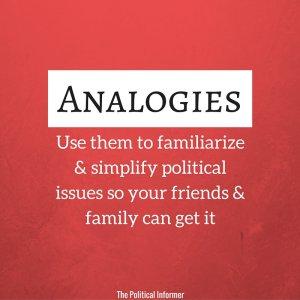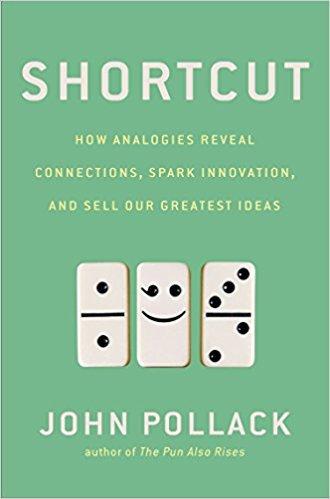Many teachers in analytical/critical thinking and writing clearly forbid students the use of analogies, because, in one sense, all analogies are faulty. However, as George Lakoff, known for his thesis that the lives of individuals are significantly influenced by the central metaphors they use to explain complex phenomena, convincingly argues that all our thinking is metaphorical.
"If we nowadays look at large companies we could say that it is basically Intensive Human Farming" "That's as useful as rearranging deck chairs on the Titanic. It looks like you're doing something helpful but really it will make no difference in the end" "Heart failure from fast atrial fibrillation is like an over-revved engine. helps patients with a mechanical background to understand what has gone wrong, as do many other mechanical analogies involving pumps, valves, and pipework of various sort "She didn't insist too much on what she was telling us, and it became clear she was in a position similar to that of a veteran Soviet bureaucrat who must work on two levels at once: reality and official ideology" "Key Concepts are as optical filters define. They define what we see and what is left out. "" Every American war since 1975-Grenada, El Salvador, Nicaragua, Panama, Bosnia, Kosovo, Kuwait, Afghanistan-tends toward comparison with Vietnam, as a cautionary reminder about the arrogance of power
Instead of prohibiting, a more constructive approach would be to apply the strengths and avoid the weaknesses of thinking in analogies.
However, how powerful and convincing analogies and metaphors could be, there is always a possibility that it contains important relevant dissimilarities. Also, sometimes analogies and metaphors might be constructed deliberately to win arguments. Than it is called framing.
Dissect analogiesA productive way to assess analogies that are presented to you is to Recognize, Analyse and Compare the used metaphor against the present situation

Recognize: To know who someone is or what something is, because you have seen, heard, experienced, or learned about them in the past
Analyse: Break an issue into its constituent parts. Look in-depth at each part using supporting arguments and evidence for and against as well as how these interrelate to one another.
Compare: Identify the similarities and differences between two or more phenomena. Say if any of the shared similarities or differences are more important than others. 'Compare' and 'contrast' will often feature together in an question.

A productive way to generate your own analogies is, according to Asking the Right Questions (M. Neil Browne and Stuart M. Keeley):

More post about analogies and metaphors:

